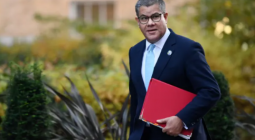Protect Cop26 climate progress from being undermined by trade rules, UK ministers told

Exclusive: Demand for ‘climate waiver’ to free countries from fear of litigation over emission cuts
Climate agreements reached in Glasgow this month could come under legal attack from polluting multinationals unless the UK takes urgent action to reform global trade rules, ministers have been warned.
A coalition of environmental campaign groups, development charities and unions are urging the government to use its clout as president of the Cop26 climate change summit to drive through change at next week’scrucial World Trade Organisation meeting.
The UK must use its “unique opportunity” to take bold action to align world trade rules with the internationally-agreed imperative to keep global warming beneath 1.5C above pre-industrial levels, the group said.
In a letter to Cop26 president Alok Sharma and international trade secretary Anne-Marie Trevelyan, seen by The Independent, they called on the UK to put pressure on the WTO to agree a “climate waiver” which would prohibit countries from using the global body to challenge one another’s climate policies.
Rules should be changed to ensure they do not “slow down, constrict, raise the cost of or otherwise interfere with climate action”, the letter said.
In addition to WTO rules, bilateral treaties can deter countries from introducing measures to reduce greenhouse gas emissions because of fear of costly arbitration of cases brought by companies which lose out from the change.
The letter highlighted the case of the Netherlands being sued by energy company RWE over efforts to phase out coal-fired power stations.
And it warned that the UK could face similar action from investors with a stake in around £120bn worth of fossil fuel infrastructure.
The EU has previously been challenged at the WTO on competition ground by China over its renewable energy schemes.
And Indonesia and Malaysia recently launched a challenge to EU policy on limiting the proportion of palm oil - seen as a major cause of deforestation - in biofuels.
Malaysia - a leading voice in the CPTPP Pacific trade partnership which Britain is seeking to join - has said that the UK would have to revise its approach to palm oil to get a trade deal.
Meanwhile, a possible ministerial statement on trade and the environment expected to be agreed at the WTO’s MC12 summit in Geneva is thought unlikely to commit members to any binding action. And a UK-backed fossil fuel subsidy statement appears to be limited to an agreement on “capacity-building and exchange of information and experience”.
And WTO rules can hamper the transfer of climate change technology to developing countries while fostering increases in unsustainable production and deforestation.
“International trade rules are standing in the way of action on climate change,” warned the letter, signed by 12 groups including the Trade Justice Movement, Friends of the Earth, Traidcraft, Global Justice Now and Unison.
“Whilst making some important steps in the right direction, the climate conference did not live up to expectations. Extreme weather events are already devastating communities around the world, and the risk of catastrophic climate change is growing. We must use all the tools available to stand the best chance of averting this.”
Calling on Ms Trevelyan and Mr Sharma publicly to confirm the UK’s commitment to ensuring trade will be aligned with climate goals, the letter said: “Your government has a unique opportunity to take bold action on trade policy.”
Trade Justice Movement senior adviser Ruth Bergan told The Independent: “The problem with the environment initiatives at the WTO is that most of them are not binding, and currently appear to be mostly talks about setting up talks about cooperation and information exchange.
“There is little evidence that they are looking in depth at WTO rules and considering how best they could be rewritten to be aligned with climate goals, at a pace that is commensurate to the challenge we face.”
The Glasgow summit accepted the United Nations assessment that a “very rapid” phase-out of fossil fuels is needed, with emissions slashed by 45 per cent by 2030 and net zero achieved by around the middle of the century, said Ms Bergan.
And she added: “The WTO needs to send a clear signal that it won’t stand in the way of measures to achieve this.
“The phase-out comes hand in hand with a need to quickly build up renewable energy infrastructure, yet governments across the world have faced WTO challenges when they have tried to do this.
“Technology transfer will be key to allowing countries to adopt new climate-friendly means of production but the WTO currently favours long patent terms that can prevent this from happening.
“The UK is in a unique position to do something about this. The ministerial meeting starting next week will be its first as an independent member and it holds the COP presidency until the end of 2022.
“We should use this moment to generate much more collaboration on and urgency regarding the need for the trade regime to properly align with climate goals. Voluntary, non-binding statements are simply not enough. At minimum, the UK should call for a moratorium on WTO challenges to climate measures.”
A government spokesperson said: “The UK is a global leader in environment and climate change and was the first major economy to pass new laws for net zero emissions by 2050. Tackling climate change is the government’s top international priority, and trade is part of the solution.
“Change at the multilateral level requires consensus, and that is why the UK is using our platform as president of Cop26 and voice at the WTO to push for ambitious international action at MC12 and beyond, promoting trade and investment that will help protect the planet for generations to come.”
25 November 2021
The Independent





